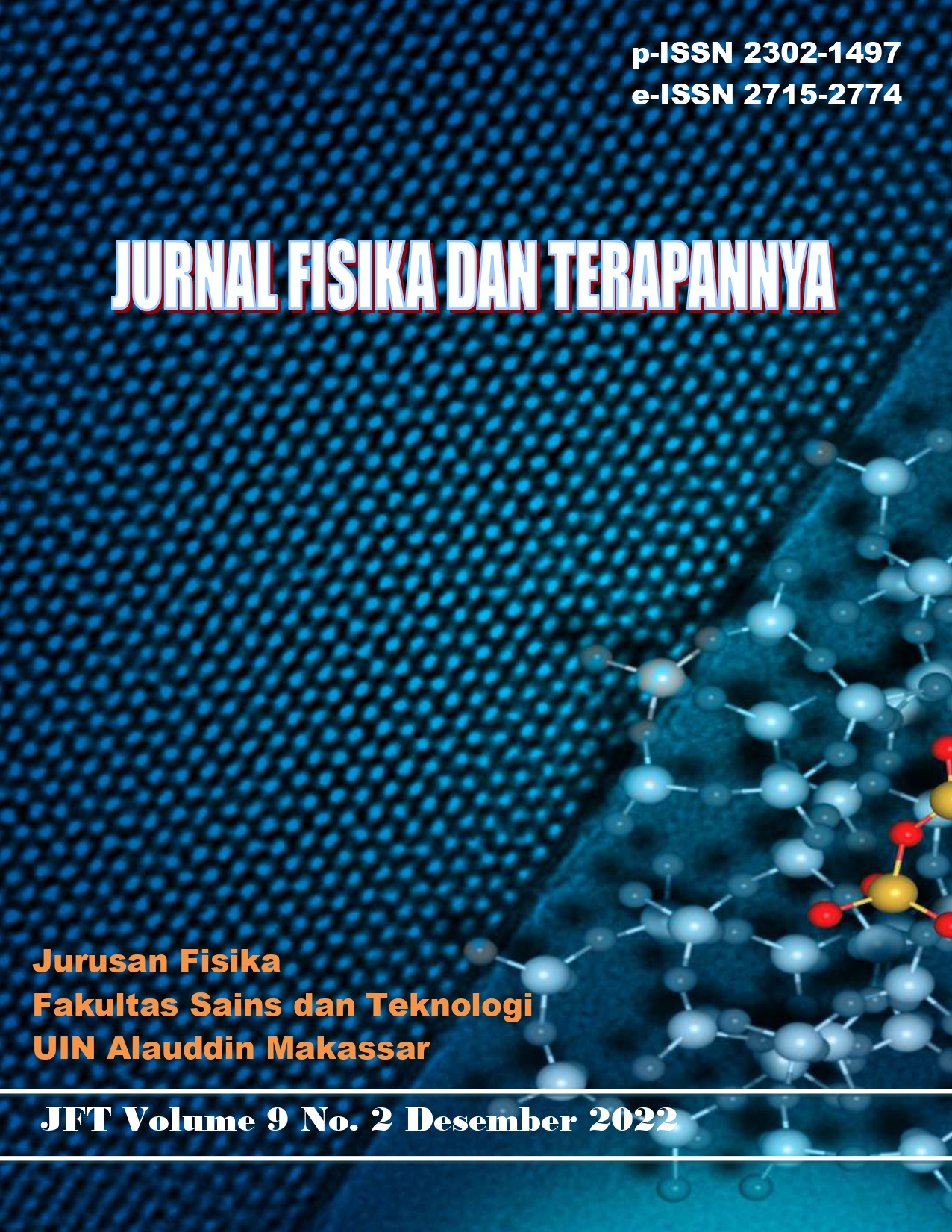Klasifikasi Kedalaman Kejadian Gempa Menggunakan Algoritma K-Means Clustering: Studi Kasus Kejadian Gempa Di Sulawesi
Abstract
Sulawesi region is one of the region that have complex geologic conditions so that disasters caused by large scale earthquake frequently occur in these region. Depth and magnitude attribute of the earthquake that cause the disasters are investigation using machine learning technique. Longitude, latitude, magnitude, depth attributes are used to depth cluster of the earthquake events in 1970-2022 period. The cluster number have been optimized by Elbow method, and validated by Davies-Bouldin index (DBI). The result is shown that the three cluster is the best cluster than the others, and its Davies-Boludin index is 0.397. Depth of the fist cluster is less than equal to 120 km (shallow earthquake), the second cluster is among 120 km and 350 km (intermediate earthquake), and the third cluster is greater than 350 km (deep earthquake). The cluster visualizations of the earthquakes are revealed that shallow earthquakes with above 5 SR are frequently occurred in shallow depth. Based on results, Sulawesi Region is vulnerable to earthquake hazard, and K-Mean clustering algorithm is successfully to cluster of earthquake depth.
Downloads
References
Badruttamam, A., Sudarno, S., & Maruddani, D. A. I. (2020). Penerapan Analisis Klaster K-Modes Dengan Validasi Davies Bouldin Index dalam Menentukan Karakteristik Kanal Youtube Di Indonesia (Studi Kasus: 250 Kanal YouTube Indonesia Teratas menurut Socialblade). Jurnal Gaussian, 9(3), 263–272. https://doi.org/10.14710/j.gauss.v9i3.28907
Davies, D. L., & Bouldin, D. W. (1979). A Cluster Separation Measure. IEEE Transactions on Pattern Analysis and Machine Intelligence, PAMI-1(2), 224–227. https://doi.org/10.1109/TPAMI.1979.4766909
Fowler, C. M. R. (2004). The Solid Earth: An Introduction to Global Geophysics (2nd edition). Cambridge University Press.
Hidayati, R., Zubair, A., Pratama, A. H., & Indana, L. (2021). Analisis Silhouette Coefficient pada 6 Perhitungan Jarak K-Means Clustering. Techno.Com, 20(2), 186–197. https://doi.org/10.33633/tc.v20i2.4556
Novinanti, P., Setyorini, D., & Rafflesia, U. (2017). K-Means cluster analysis in earthquake epicenter clustering. International Journal of Advances in Intelligent Informatics, 3, 81. https://doi.org/10.26555/ijain.v3i2.100
(PDF) K-Means cluster analysis in earthquake epicenter clustering. (n.d.). Retrieved June 5, 2022, from https://www.researchgate.net/publication/319467407_K-Means_cluster_analysis_in_earthquake_epicenter_clustering
Rifa, I. H., Pratiwi, H., & Respatiwulan, R. (2020). Clustering of earthquake risk in indonesia using k-medoids and k-means algorithms. Media statistika, 13(2), 194–205. https://doi.org/10.14710/medstat.13.2.194-205
Rousseeuw, P. J. (1987). Silhouettes: A graphical aid to the interpretation and validation of cluster analysis. Journal of Computational and Applied Mathematics, 20, 53–65. https://doi.org/10.1016/0377-0427(87)90125-7
Sculley, D. (2010). Web-scale k-means clustering. Proceedings of the 19th International Conference on World Wide Web - WWW ’10, 1177. https://doi.org/10.1145/1772690.1772862
Setiyono, U., Gunawan, I., Yatimantoro, T., Imananta, R. T., Ramadhan, M., Hidayanti, Angraini, S., Hawati, P., & Yogaswara, D. S. (2019). Katalog gempabumi signifikan dan merusak 1821—2018 (Jakarta; Vol. 1). Badan Meteorologi Klimatologi dan Geofisika.
Supartoyo, S., Sulaiman, C., & Junaedi, D. (2014). Kelas tektonik sesar Palu Koro, Sulawesi Tengah. Jurnal Lingkungan Dan Bencana Geologi, 5(2), 111–128. https://doi.org/10.34126/jlbg.v5i2.68
White, L. T., Hall, R., Armstrong, R. A., Barber, A. J., BouDagher Fadel, M., Baxter, A., Wakita, K., Manning, C., & Soesilo, J. (2017). The geological history of the Latimojong region of western Sulawesi, Indonesia. Journal of Asian Earth Sciences, 138, 72–91. https://doi.org/10.1016/j.jseaes.2017.02.005
Yanuarto, T. (2021). Pembelajaran Gempa Sulbar, Fenonema dan Dampak Kerusakan Bangunan [BNPB]. https://bnpb.go.id/berita/pembelajaran-gempa-sulbar-fenonema-dan-dampak-kerusakan-bangunan
Copyright (c) 2022 Amirin kusmiran, Minarti, Muhammad Fawzy Ismullah Massinai, Ahmad Zarkasi, A. Andira Maharani, Rita Desiani

This work is licensed under a Creative Commons Attribution 4.0 International License.


